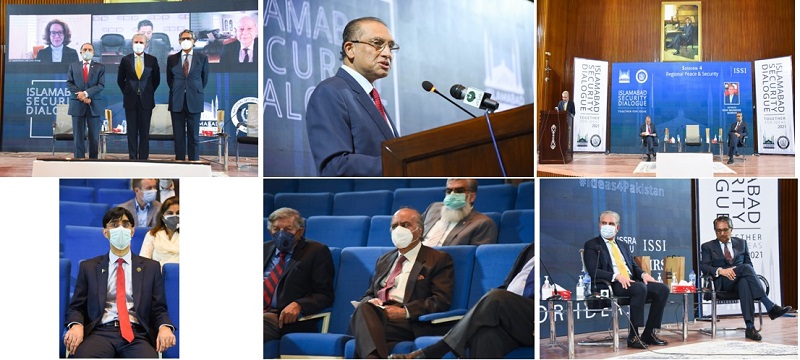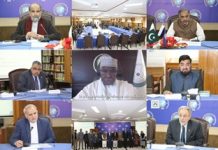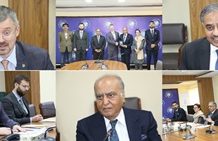PRESS RELEASE
Islamabad Dialogue
Session 4 – Regional Peace and Security
March 18, 2021

The Institute of Strategic Studies Islamabad (ISSI) hosted the fourth working session ‘Regional Peace and Security’ at the Islamabad Security Dialogue. The session was convened and moderated by Ambassador Aizaz Ahmad Chaudhry, Director General ISSI. The Keynote Address was delivered by the Foreign Minister H.E. Shah Mahmood Qureshi.
Welcoming the participants, Ambassador Aizaz gave an overview of the present security situation in the region. He said that the world around us is going through major changes and power competition is intensifying. He stated that US Indo-Pacific strategy to contain China has emboldened the Modi regime which is jeopardizing the fundamental rights of Kashmiris. He said that Pakistan wants a peaceful neighbourhood and the aim of this session is to discuss possible solutions for lasting peace in the region.
The Foreign Minister stated that the world is going through profound transformation and new partnerships are being created, moreover the policy of containment of China are sowing seeds of a new cold war. He said that Pakistan is advocating peaceful coexistence and cooperative multilateralism. He stressed that durable peace and development in the region hinges on peaceful settlement of the long standing Kashmir dispute. The Minister added that Pakistan is steadfastly supporting an Afghan-led and Afghan-owned peace process. He also said that Pakistan’s focus is now economic security and focus is increasingly shifting from geopolitics to geo-economics. Pakistan’s outlook has fundamentally transformed and world need to change its view about Pakistan.
The panel at the session included: Dr. Hu Shisheng, Director, China Institutes of Contemporary International Relations; Ambassador Jalil Abbas Jilani, Former Foreign Secretary; Ms. Laurel Miller, Director, Asia Programs, International Crisis Group; and Ambassador Dr. Akbar S. Ahmed, Professor, School of International Service, American University, Washington D.C. They discussed issues related to CPEC, Kashmir, Afghan Peace Process and Pakistan as a Bridge Builder in the Muslim World.
Dr. Hu highlighted the progress of CPEC and economic cooperation between China and Pakistan. He said that CPEC has advanced despite the challenges posed by COVID-19 while adding that CPEC has already changed the economic and demographic landscape of Pakistan. He informed the audience that considerable steps have been taken to improve Pakistan’s trade balance with China which will be vital for a successful economic cooperation.
Ambassador Jalil Abbas Jilani covered Pakistan-India relations. He said that Pakistan and India are in a state of perpetual hostility and India has repeatedly turned its back on the commitments and agreements with Pakistan. He added that this is the darkest time of this relationship due to Modi’s commitment to Hindutva. On future prospects, he was of the opinion that countries like US and UK can play a significant role in de-escalating the tensions and bringing the two sides on one page. He blamed the US strategic cooperation with India for Delhi’s aggressive policies with its neighbors.
On the Afghan Peace Process, Ms. Laurel Miller sharing her observations said that the current circumstances are not conducive. The renewed emphasis on multilateral diplomacy and bringing together key regional countries is important and it will make the peace process more sustainable. She added that the peace process is at a very precarious moment and there is a high risk that it might collapse. She called out the US for pursuing its own interest in the region at the expense of peace.
Dr. Akbar Ahmad shared his views on improving Pakistan’s perception in the world. He stated that the negative image of Pakistan affects everyone and the new generation more than before and emphasised on the need to project the principles of Quaid-e-Azam to rebuild the image of the country. He suggested that Pakistan should make use of its rich culture and Sufism to portray its enlightened and tolerant side.
Concluding the session, the Foreign Minister stated that Pakistan has to recognize the new realities and engage constructively with rest of the world without compromising on its key positions.











